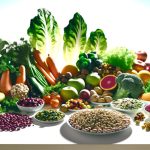Studies show that it could be a good idea to limit your intake of red meat, sugary beverages, salt, alcohol, coffee, trans-fatty acids, and an excessive amount of omega-6 fatty acids if you suffer from rheumatoid arthritis.
It is unlikely that by solely eliminating certain foods and nutrients from the diet that there will be a substantial change in rheumatoid arthritis. Instead, it is the kind of diet you follow as a whole that makes a big difference.
The way you eat will either help protect you from developing rheumatoid arthritis, and will even slow the progress of it if you already have the condition, or it can do the opposite and increase your risk and make it worse.
What is Rheumatoid Arthritis?
Rheumatoid arthritis is a persistent inflammatory condition caused by the body’s own immune system attacking the joints. It can lead to joint harm, muscle deterioration, agony, solidness, weariness, and it diminishes the personal satisfaction in individuals influenced (Guo et al., 2018).
It has been estimated that rheumatoid arthritis appears in a range of 0.06-1.27% of people within the global population (Almutairi et al., 2021). Women experience it three to five times more than men do (Simard et al., 2010). Researchers do not know precisely what triggers rheumatoid arthritis, but they believe that it may be a result of a combination of genetic and environmental factors.
Some folks have alterations to their genetic makeup that make them more prone to the disorder. When exposed to environmental elements like smoking, air pollution, dust, microbes, and poor dietary habits, the immune system of individuals can be weakened to the point where it begins assaulting their body, resulting in rheumatoid arthritis.
Researchers are beginning to understand that diet and the nutrients one consumes can be important factors in determining when someone will develop the condition, as well as how it progresses. Although there appears to be a link in some studies between eating habits, such as fruits, vegetables and red meat, and the emergence of the disorder, the results are still inconclusive.
Studies that have been done recently have suggested that the diet may have an effect on when and how serious someone’s rheumatoid arthritis becomes.
The Evidence Linking Diet to Rheumatoid Arthritis
Chronic inflammation – which involves discomfort, swelling, reddening and fever – is the primary cause of rheumatoid arthritis as well as many other continuous illnesses like type 2 diabetes, cardiovascular disease, and Alzheimer’s disease (Furman et al., 2019).
The presence of inflammation leads to higher amounts of proteins that are responsible for long-term harm, including c-reactive protein (CRP), interleukin (IL)-6, and tumour necrosis factor-alpha (TNF-?) (Furman et al., 2019). Nutrients and other components found in food can significantly affect ailments such as rheumatoid arthritis by either decreasing or intensifying the inflammation.
Lots of focus is given to carbohydrates and fats as nutrients.
Studies now show that carbohydrate quality affects inflammation. Studies conducted by Buyken and colleagues in 2014 discovered a correlation between a diet composed of not-refined carbohydrates with high amounts of fiber, as well as necessary vitamins and minerals, and lower concentrations of CRP, IL-6 and TNF-?.
It has been demonstrated by a multitude of research projects that trans-fatty acids can harm blood vessels and lead to elevated levels of TNF, CRP, and IL-1 (Mozaffarian, 2006). Fish oils which contain omega-3 fatty acids have been demonstrated to reduce both IL-6 and CRP levels, as demonstrated in a 2002 study conducted by Simopoulos.
EGCG, a component in green tea, has been found to counteract the effects of certain inflammatory proteins like IL-1, as reported in a 2006 article by Ahmed et al. EGCG has been found to have anti-inflammatory properties in mice with arthritis, yet it has not yet been established if it has the same effects in people (Min et al., 2015).
Flavonoids, compounds with antioxidative, anti-bacterial and anti-inflammatory effects, are found in fruits and veggies. The study conducted by Zhang et al. in 2012 showed that genistein, a prominent flavonoid found in soybeans, was able to impede the activities of IL-1 and TNF in joint cells from individuals with rheumatoid arthritis.
The Foods and Eating Habits Linked to Increased Risk and Faster Progression of Rheumatoid Arthritis
Evidence shows that an abundance of red meat, specifically for its large concentrations of saturated fat and nitrites, may lead to a heightened danger of arthritis (Grant, 2000; Pattison et al., 2004; Jin et al., 2021). Despite what one may assume, a Chinese study from 2016 and the Nurses’ Health Study from 2007 do not indicate any association between eating red meat and having a greater risk for arthritis. (He et al., 2016; Benito-Garcia et al., 2007).
Eating a lot of salt is linked to a greater chance of developing rheumatoid arthritis. Recent findings suggest that having a high salt diet may promote inflammation in the body due to increased activation of inflammatory immune cells and decreased activity of anti-inflammatory, regulatory immune cells (van der Meer and Netea, 2013).
There is a connection between consuming large amounts of sugary beverages and rheumatoid arthritis. Results from the Nurse’s Health Study demonstrated that people who drink a lot of sugar-sweetened drinks are more prone to rheumatoid arthritis.
Eating diets with a lot of fat has been linked to the possibility of developing rheumatoid arthritis. Research conducted on rodents suggests that diets with a high fat content can provoke an increase in inflammatory proteins which can lead to arthritis. Similar findings are noted in people with rheumatoid arthritis. (Na et al., 2017).
Drinking four or more cups of coffee each day is linked to an increased chance of developing rheumatoid arthritis. This relationship has only been observed in individuals who smoke (Mikuls et al, 2002; Heliovaara et al., 2000; Schereiber et al., 1988).
A majority of the foods listed are commonly eaten in Western cuisines. Overall, research indicates that consuming a diet which is high in red meat, full of saturated and trans-fat, and high in refined carbohydrates and low in omega-3s may lead to a heightened risk for rheumatoid arthritis and cause greater distress for people plagued with the condition (Manzel et al., 2014).
What is a healthy diet for people with rheumatoid arthritis?
A well balanced eating plan for those with rheumatoid arthritis should be made up mostly of foods that are not processed and are whole, like whole grains, beans, fruits, vegetables, nuts, and seeds.
Including fatty fish like sardines, salmon, and/or trout should be part of the diet. You should switch out vegetable oils that are high in omega-6 fats for fruit oils like olive and avocado, and cut back on your consumption of red meat. One may want to consider ingesting probiotics since they have the potential to raise the levels of beneficial bacteria in the digestive system, alleviate inflammation and bolster immunity.
Avoid or limit sugar-sweetened drinks, salt, alcohol, and coffee. A vitamin D supplement is a worthwhile addition to one’s regimen, particularly if they inhabit a moderate climate, as it is known to bolster bone health, while possibly having a moderating effect on rheumatoid arthritis.
ZinC-ADE by Purium is our “first line of defense” product to support your immunity! ZinC-ADE delivers specific, targeted, plant-sourced nutrients (Zinc and Vitamins A, C, D & E) to support a healthy terrain throughout the body while keeping with Purium’s pure, whole-food approach to immune support.
The Study
A study looking at how an anti-inflammatory diet impacts rheumatoid arthritis activity and wellbeing, called the Anti-inflammatory Diet In Rheumatoid Arthritis (ADIRA) study protocol, is being done in the form of a randomized controlled cross-over trial.
Background
Rheumatoid arthritis is a long-term condition that affects a small number of people, estimates range from 0.5 to 1.0%. Despite medications, many sufferers are unable to reach a state of remission. The consequences of this are both physical and psychological, resulting in a drastically lowered standard of living and the inability to effectively complete tasks. Therefore, it has a large financial impact on both individuals and the community. In addition to current pharmaceutical treatments, it is important to consider lifestyle interventions as a form of therapy. Studies suggest that the anti-inflammatory properties of individual foods can be beneficial to those with rheumatoid arthritis, yet no research has been conducted to elucidate the maximum benefit that could be obtained from combining these foods and the potential improvement in quality of life for sufferers. The aim of the ADIRA study (Anti-inflammatory Diet In Rheumatoid Arthritis) is to check whether an anti-inflammatory diet, in comparison to a regular diet, can reduce the severity of symptoms and enhance quality of life in individuals with long-term RA.
Methods
Altogether, 50 individuals who have been diagnosed with Rheumatoid Arthritis and display moderate inflammation are randomly assigned to either consume an eating plan consisting of various items believed to reduce inflammation, or a regular diet for two 10-week-long trials made with a three-month interval in between. Each week, participants who are partially blind receive two bags of food from a home delivery organization. These bags, known as the fiber bag and the protein bag, supply necessities for the individuals. Both groups continue with regular pharmacological treatment. Identifying dietary consumables will be used to evaluate how well the change was accepted. The effects on how extreme the disease is (as judged by the DAS28, a measure that predicts how bad the disability of rheumatoid arthritis will get and if it will get worse), factors that show what the chances of having heart and vascular problems are, as well as people’s standard of living, are examined after each dietary plan. Metabolomics will be employed to determine the possibility of forecasting individuals who will respond positively to dietary care. A health economic evaluation is also included.
Patients with RA tend to have a bad diet, some are overweight or very overweight and they go to their doctor to ask for guidance on what to eat. Despite the lack of large-scale studies into dietary intervention for people with RA, there is currently no evidence to suggest any particular diet for these patients. The majority of existing research is based on observation or limited dietary items. ADIRA will offer excellent scientific data thanks to its advanced methodology for calculating diet composition and assessing adherence with biomarkers. This concept is fresh and imaginative in its utilization of a portfolio diet and home-delivery services. The portfolio diet intervention utilizes a variety of individual food components that are likely to have a synergistic anti-inflammatory effect on different manifestations of rheumatoid arthritis. The potential to benefit from the treatment is great due to its low rate of negative effects and low expense when compared to newer, more powerful drugs. The trial is conducted to measure how effective something is, so internal validity is the most important factor and a lot of attention is paid to making sure it is high. The importance of evaluating external validy, while not as great as in this efficacy test, is able to be assessed since participants are selected from the Swedish Rheumatology Quality Register. The results from our pilot experiment consisting of individuals with RA demonstrated that it was possible to generate valid results.
Strengths
ADIRA trial has several strengths. The design of this experiment has been crafted in a way that reduces differences between the diets of each individual. This study involves the entire population of people with RA in the targeted area as they are all registered in the Swedish Rheumatology Quality Register and asked to take part in the trial. At the outset of the study, the participants are assigned to an allocated diet, which should ensure that seasonal changes, any special occasions, and any impacts remaining from the preceding examination interval are distributed properly between both diets. The nutrition plans designed by certified nutritionists are composed of similar amounts of macronutrients and energy. Food bags arrive at the residences of participants on a weekly basis courtesy of a home-based food delivery service, providing a handy solution. The food is simple to make or already prepped, and it is very nutritious. Participants who have partial sight are informed that there are two packages to choose from, one labeled as “Fiber Bag” and the other as “Protein Bag,” but evaluators of the results are not aware of the contents.
Limitations
The trial also has some limitations. Women are more prone to the sickness than men, which is evident in the study group where males compose a comparatively small portion. The hiring zone is exclusive to the Västra Götaland District, so people can go to the research clinic at Sahlgrenska University Hospital in Gothenburg and get the food packages sent to them at home. In order to get the desired number of participants within this region, broad criteria for inclusion are being used. The age range of participants is from 27 to 74 years, the illness has been present for a minimum of two years, and the type of medications they take varies significantly between individuals and through the passage of time. Invitations were sent to those living in SRQ in Västra Götaland Region via postmail and notices were placed at Sahlgrenska University Hospital. Out of the 66 patients approved for assessment, 3 out of 4 met the criteria to participate in the study. Consequently, those who participate in ADIRA are a specific group of people with Rheumatoid Arthritis, and the possibility of selection bias must be taken into account. Data about people who participated in the ADIRA study will be compared with details about individuals in Sweden who are suffering from rheumatoid arthritis from the Swedish National Patient Register. The DAS28 is a measurement of the overall impact of the condition that combines objective findings, such as the erythrocyte sedimentation rate and number of swollen and tender joints, with subjective notions from the patient, like the patient-reported evaluation of their health. The most significant result from a clinical standpoint is this one, yet, its degree of subjectivity must be taken into account when analyzing what it shows.
During each 10-week diet period, participants only have 5 days where they receive a full dietary intake of food. They have been given directions to include meals that adhere to the intervention diet, but it is uncertain how much they are doing this. Biomarkers that measure adherence to the diet plan are combined with a telephone discussion halfway through the diet period, plus a log of all food eaten during a 3-day period at the end of the diet. This will only partially capture compliance. Nevertheless, as ADIRA is an experiment that investigates how two different sets of elements perform under the same conditions, each participant in the study serves as their own comparison. It is expected that the regular diet of each person will remain the same during both time periods, except for what is specified by the intervention being studied. This should help to reduce the influence of the regular diet on the outcome of the intervention.
Conclusion
ADIRA is researching how diet can help manage symptoms associated with rheumatoid arthritis, and will assess if it can minimize disease activity and improve the quality of life. Additionally, the study could determine if dietary treatment for RA could reduce expenses for patients and society as an addition to traditional medications.
Takeaway
The way you eat in general has an influence on your chance of getting rheumatoid arthritis and how severe it might be.
Instead of stressing over what foods not to eat, concentrate on transforming your dietary patterns and incorporating lots of natural, unrefined foods. Make sure to incorporate a varied diet that includes plenty of fruits and vegetables, whole grains, legumes, nuts, seeds, probiotics, and fatty fish. Steer clear of manufactured edibles such as sugary drinks, smoked meats, and excessive booze.
Incorporate plenty of physical activity, have adequate amounts of sleep, and stop smoking cigarettes.
It may be a while before the positive effects of these alterations become evident. But if you are consistent, you’ll reap the benefits.









